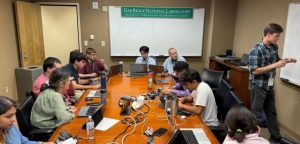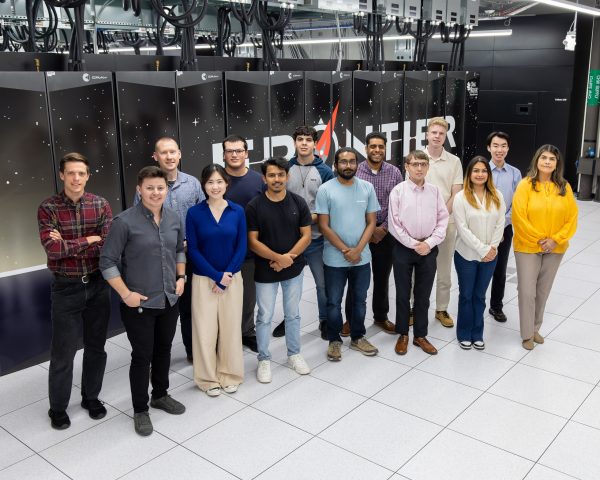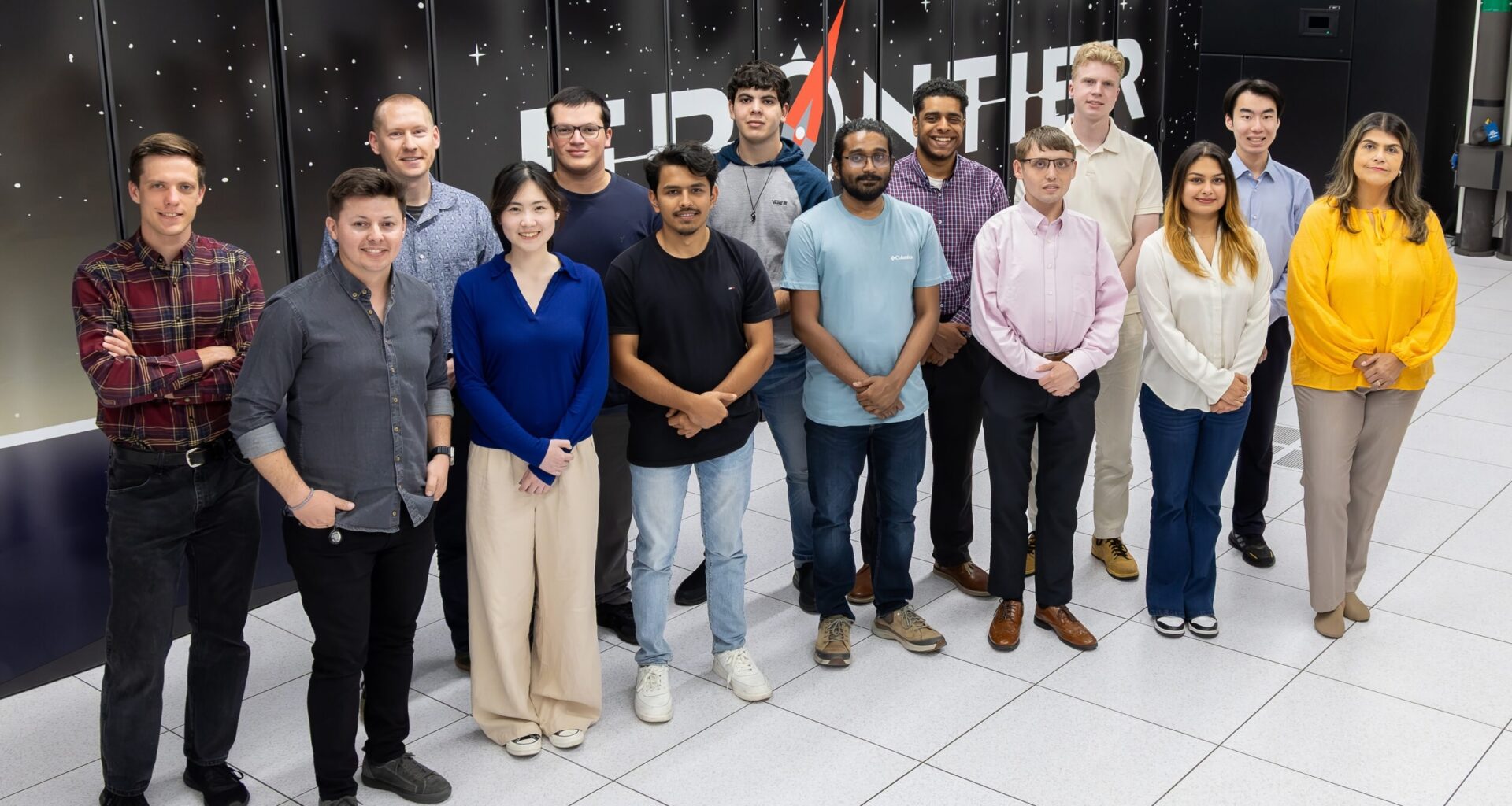Building on a successful pilot with students from this summer’s Pathways to Computing Internship Program, the Oak Ridge Leadership Computing Facility at the Department of Energy’s Oak Ridge National Laboratory will launch a new training program to develop the next generation of advanced computing professionals: hands-on administration of high-performance computing, or HPC, systems.
Set to launch in June 2026, the Oak Ridge Computing Academy, or ORCA, will be an annual event — open to students and professionals — that will task participants with building, configuring, and operating an HPC cluster, thereby providing firsthand experience in how these systems work.
Dr. Fernando Posada, who leads the National Center for Computational Sciences’ System Acceptance and User Environment Group at ORNL, decided to introduce the systems-oriented course to address the shortage of training opportunities in the fundamentals of HPC operations.
 Students in this summer’s Pathways to Computing Internship Program at the Department of Energy’s Oak Ridge National Laboratory learned how to assemble and run a computer cluster. The week-long pilot class is a preview for a dedicated workshop starting in 2026: the Oak Ridge Computing Academy. Credit: Fernando Posada, ORNL.
Students in this summer’s Pathways to Computing Internship Program at the Department of Energy’s Oak Ridge National Laboratory learned how to assemble and run a computer cluster. The week-long pilot class is a preview for a dedicated workshop starting in 2026: the Oak Ridge Computing Academy. Credit: Fernando Posada, ORNL.
“Our training here at the OLCF is mostly focused on being an HPC user — how to log in to the machines, how to run different workflows, how to use the machines properly to enable users to use our machines more efficiently,” Posada said. “But there is another side of things behind the curtain: actually setting up those machines. So, with ORCA, we will start from scratch. We’ll provide physical servers that we’ll put together so, at the end of the course, we can have a functioning cluster.”
Students may lack direct experience in the technical aspects of system administration because it’s not usually part of their degree programs. However, because HPC clusters are the foundation of significant computational science as well as artificial intelligence campaigns, there is a growing need for expertise in this area.
“One of the things the workshop addresses is a gap we see in academia. A lot of the focus in HPC curricula relates to parallel programming — making use of parallel programming models, parallelizing algorithms, things along those lines. But we don’t really see a lot of material relating to the more system administrative side of things,” said John Holmen, an HPC engineer in Posada’s group who helped teach ORCA participants during this year’s pilot.
Such firsthand experience provides students with more than just technical knowledge of the systems on which they run their programs — it equips them with the vocabulary needed to effectively address any issues they may face.
“Through ORCA, participants will be able to provide more detailed information to the system administrators — the people who are going to help them — when they are facing issues. They’re going to become more powerful users who will be able to better describe their compute and data problems,” Posada said.
Posada originally designed the weeklong course for masters-degree students, but he adjusted it for the undergraduate students who participated in this summer’s Pathways to Computing Internship Program. Although Posada, Holmen, and HPC engineer Asa Rentschler couldn’t use physical servers in their class assignments for the pilot, they created daily exercises that walked students through configuring a virtual machine.
“The students came from a wide variety of backgrounds, including some that weren’t as closely related to the topic material, such as mathematics. Most of them had little to no prior networking experience. But it was pretty exciting to see how enthusiastic some of the students were and what they were able to accomplish in a week,” Holmen said.
Bimarsh Bhusal, a junior majoring in mathematics and computer science at the University of Southern Mississippi, had never even considered building and configuring a computer cluster before taking the pilot class. Now that he has a fundamental understanding of what a cluster is, how it is built and how to manage it, Bhusal plans to put that knowledge to use.
 This year’s PCIP interns and ORCA mentors, from left: ORCA Mentors Asa Rentschler, Fernando Posada, John Holmen; Students Yiwen Chen, Carlos Delgado Vega, Bimarsh Bhusal, Estaben Rodriguez Denis, Adib Kabir, Adham Abrahim, Carter Gatland, Yaroslav Petrashko, Sheryl Arya, Jingran Huang, and Eliana Valenzuela Andrade. Credit: Alonda Hines, ORNL, U.S. Dept. of Energy.
This year’s PCIP interns and ORCA mentors, from left: ORCA Mentors Asa Rentschler, Fernando Posada, John Holmen; Students Yiwen Chen, Carlos Delgado Vega, Bimarsh Bhusal, Estaben Rodriguez Denis, Adib Kabir, Adham Abrahim, Carter Gatland, Yaroslav Petrashko, Sheryl Arya, Jingran Huang, and Eliana Valenzuela Andrade. Credit: Alonda Hines, ORNL, U.S. Dept. of Energy.
“After I return to my university, I am thinking of building a cluster from scratch. I will use very old office desktops and buy old GPUs and build a mini cluster of about three nodes. I will also run simulations off-loading to CPU and GPU and measuring the differences,” Bhusal said. “I am also thinking of starting an HPC club at my university to teach and learn with other people.”
Posada is refining the coursework based on lessons learned from the pilot and will launch ORCA next June — this time with physical hardware for its participants to work on. Announcements will be made with application requirements and workshop dates.
“ORCA fills an important gap in the education of ‘modern’ HPC users. Experimentalists never question the need to fully understand their apparatus. Computational scientists should feel the same way about HPC platforms,” said Bronson Messer, the OLCF’s director of science.
The OLCF is a DOE Office of Science user facility located at ORNL.
This article was originally published by OLCF at Oak Ridge National Laboratory and is reprinted with permission.

